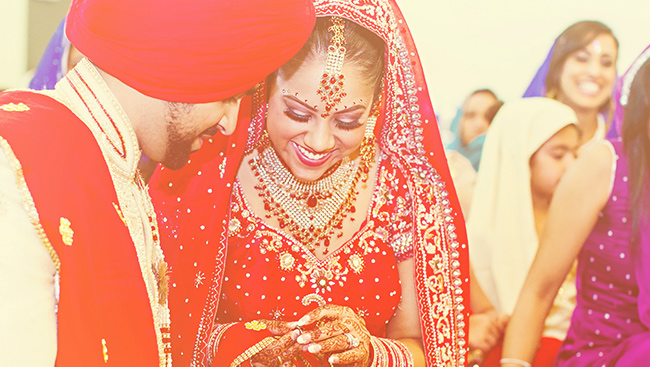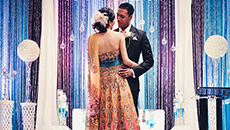Marriage is one of the most significant events that each of us has or ever will experience in our lives. When focusing our lens even closer onto South Asian families, such a life-changing event can have a noticeable impact not only on each family, but also on the bride and groom. A tremendous amount of transitioning is inevitable for the bride and groom, particularly for the South Asian bride.
Both the bride and groom will make many emotional, physical, and financial adjustments in their new lives, but the bride continues to be bombarded with more stress because of the transitioning and balancing of traditional and western expectations.
First and second generations of South Asians are continually faced with many inter-generational and cultural challenges that make this journey even more complex than meets the eye. Regardless of cultural or religious belief, the institution of marriage has greatly affected and influenced women. But based on traditional values, roles, and beliefs, the married South Asian woman’s status evolves as her status in the community is usually elevated.
Aspects of the marriage process; from searching for the potential mate to family (and partner) introductions are changing, but in traditional Indian families this process continues to focus on the uniting of two families rather than of the individuals themselves.
In a traditional family, whether it is an ‘arranged marriage’ or an ‘arranged introduction,’ if parents are choosing their ‘child’s’ future partner, there are many potential conflicts and decisions that are often made without knowing or understanding the needs and fulfillments that newlyweds require in order to successfully adjust and prosper. Moreover, the myriad of struggles that are faced by the bride-to-be continues to be misunderstood.
In these families, the bride is expected to move from her family and comfort zone and to her husband’s family and dwellings. This is a change that is continually taken for granted and least understood. Although it might be a financially viable arrangement, we tend to neglect just how emotionally stressful this transition is for the bride. Indeed, there is an adjustment required from the groom and his family, but it is much less stressful in comparison to the new family member. She must adjust to a different family dynamic along with all the other changes in her life.
In doing so, the bride must now undergo many struggles. In fact, this is one of the most critical times in her life during which she is most vulnerable to emotional and mental distress leading to mental health issues. Research confirms that this is the most prevalent time in her life when she will seek outside support from counsellors.
Many conflicts may lead to anxiety, grief, loss, trauma, crisis, and adjustment disorders. But when these issues are coupled with anger, depression, and social isolation, they become even more complex, misunderstood and often misdiagnosed. If not effectively prevented from the beginning, more serious experiences such as: self-harm, suicide, domestic violence, and divorce are likely to follow.
An increasing number of South Asian professionals who have experienced these inter-generational and cultural struggles themselves are effectively supporting women and couples during these times. South Asian women are gradually starting to receive preventative and compassionate support, now more than ever before. But our communities are only beginning to understand how exciting yet potentially stressful this life-changing time is for brides-to-be.

So what can each couple (especially the bride) do to overcome these hurdles to a peaceful marriage? Our aim is to make the transition between being single, to the marriage itself as easy as possible and to work towards a thriving union. There are several steps that each couple can take to keep a marriage happy, peaceful, and long-lasting:
1. Know yourself well. Are you ready for a life-long commitment? What are your likes, dislikes, preferences and personality type? What type of personality is most compatible to yours?
2. Determine your dreams, goals, and aspirations as well as your potential partner’s.
3. Give yourself time to contemplate, dream and to financially, mentally and emotionally prepare for this huge change in your life.
4. This may be too westernized for some, but date several people before choosing your potential mate. This may not be possible within certain families, so it’s acceptable if you’ve completed step one properly. Although experience through dating is ideal, have you dated and been in a relationship for a reasonable duration prior to deciding on ‘the one’? The idea behind this is to fully understand (each other’s values, beliefs, attitudes, and behaviours that base a person’s expectations and lifestyles) before making the commitment & investments of a wedding and a long-term marriage.
5. Know what your future family and in-laws’ expectations are from you (especially for brides moving into her extended family’s dwellings). What family-type do your in-laws fit into? Is it traditional, progressive, or a westernized family and how will this affect you? Each type of family will have its own struggles to adjust to and overcome.
6. Observe how your potential mate reacts to being sick or deals with stressful events? Unfortunately, each of us will have tough times as well and how we tackle these challenges will predict our future coping mechanisms.
7. Resolve pending financial, emotional, or mental health issues that could be detrimental to your life or your partner’s life?
8. Engage in premarital counselling before getting engaged.
Premarital counselling is not only meant to ‘fix’ problems, but it is also a preventative measure that is very important. This can be the difference between a happy, long-term marriage and a potential divorce. Contrary to what some believe; a wedding planner does not replace a pre-marital counsellor – who will help discuss topics that are difficult to deal with and will work with the couple to develop strategies to resolve potential issues. If we work together in supporting newlyweds, especially the bride; then we can help to eliminate the serious issues that are detrimental to marriage.
Marriage; like all relationships, takes considerable time and effort to sustain and nurture. This unity of two families and of two unique human beings is an incredible journey. Along the way, a couple will face many successes and downfalls, but if they are courageous enough to fulfill one another’s needs first and then their own, then each life partner may discover a far greater truth than each may have found apart.
Top Wedding Invitation Trends
If you are looking for a unique spin on wedding invitations –look no further. 2010 has a myriad of choices for weddings.
Indian Fusion Prints
Big bold colors and bright patterns paired with sleek and sophisticated designs offer a fun new way to give your wedding invitations some individual style. Select a color combination that you can carry throughout your event to make sure your wedding invitations set the right tone for your special day.
Destination As Inspiration
Let your destination wedding determine the look and feel of your wedding invitations. From Paris to Hawaii, special locations deserve unique wedding invitations that will have your guests dreaming of your getaway long before they board their flights.
Outdoor Chic
Add a few natural touches to your wedding invitations in order to bring a rustic charm to your entire celebration. You can choose from traditional wedding invitations featuring trees, leaves and flowers
Photo: Amrit Photography

